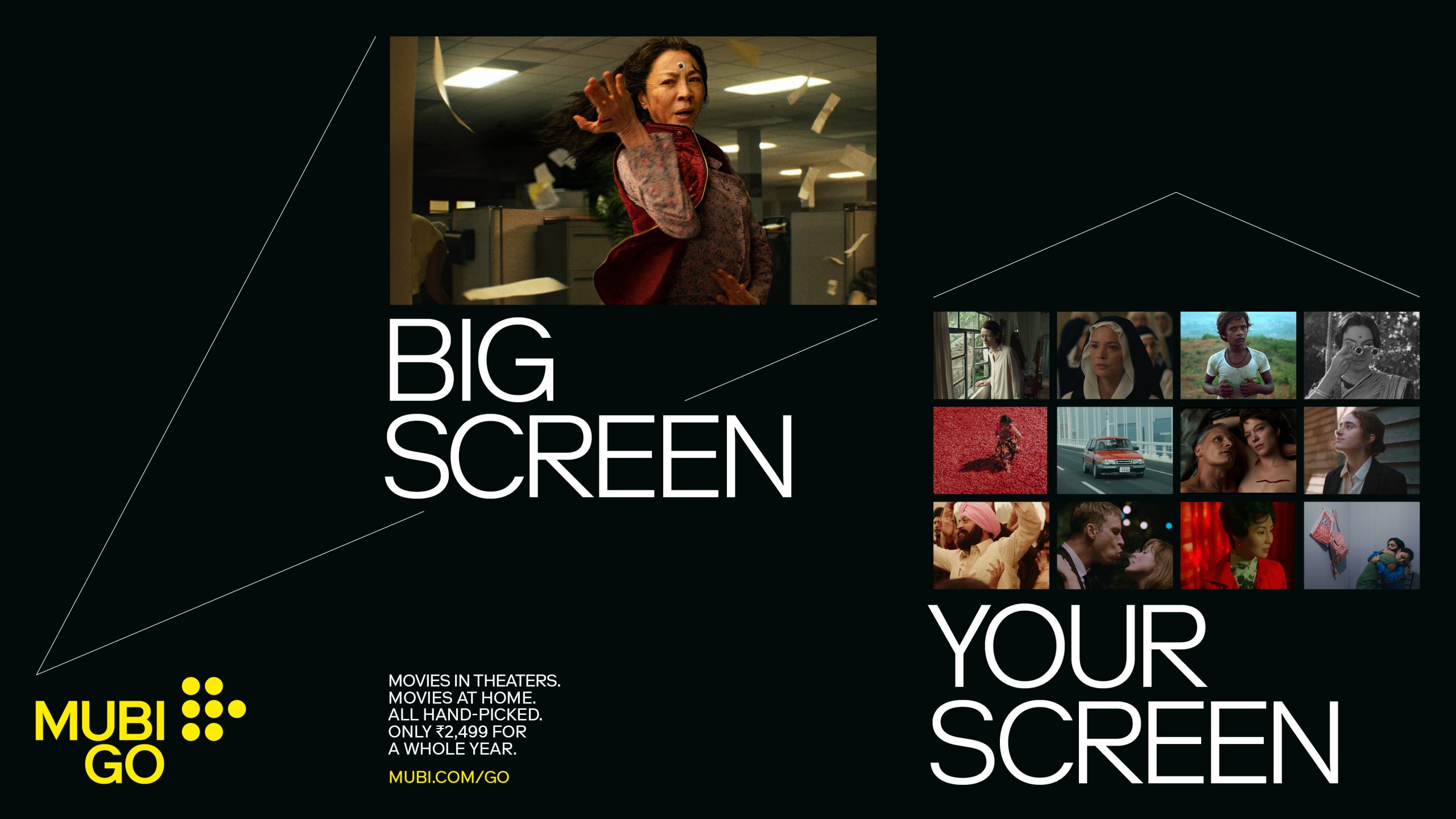I often forget how much I like watching films in theatres; how different it is from watching on a screen at home. MUBI’s recent release of its MUBI GO feature, where you can subscribe to watching curated films in the theatre every month, is an exciting opportunity for us lovers of the cinema. And here’s why.
Growing up, my parents never took me to the cinemas. Parents of two, four if you count my old, dependent grandparents, and earning clean, government salaries of a schoolteacher and a clerk, it always felt like a frivolity they didn’t care for and, honestly, couldn’t afford.
Now, of course, the 12 year old me that had gotten obsessed with stories and would watch everything on TV and DVD possible and was now realizing she wants things, was really annoyed. Every time I would bitterly exclaim, “You have never even taken us to a cinema hall! I don’t even know what that feels like!”, my mother would give me the same story as a counter argument. A loose translation of what she would say goes something like, “Sike! Gotcha! Because you were literally taken to the cinema when you were 6 months old and in my lap. The entire family went to watch Hum Saath Saath Hai Together!Beat that you little-”
It’s a very loose translation. Yet, the drama of the entire situation is as amusing as the drama of the film we had watched that day and its subsequent recollections. An extended family of three brothers and three sisters, their kids, and the grandparents, all occupying at least two rows in the cinema hall to watch a film about Indian family values, the conflicts and the happy endings. All referencing to it later at the dinner, saying, “A family that eats together, stays together!”
And this is what watching films in a theatre is- it is an event. It has been so for the Indian audience since the conception of single screens, and then later even multiplexes. Of course, paradigm shifts have occurred. The shift from single screens to multiplexes, and then halls as part of a mall structure, has changed the dynamics of the theatre. Yet, lovers have always hid in corner seats of Shahrukh Khan films and rowdy groups of friends have always whistled at Sanju baba and Govinda dancing. Babies have cried and annoyed audiences in cinema halls since the beginning of time and laughs have always been shared at the silent snoring of that middle-aged uncle who came just to sleep in the air-conditioned halls.
Another huge paradigm shift has occurred in the past few years, triggered both by the pandemic and the proliferation of technology- majorly, the boom in OTT platforms and 4G smartphones. As we are slowly coming out of the pandemic, the film industry can notice a lot of changes in consumer behaviors and the practice of viewing. “The big lesson is that the audience will not settle for average content… If the content is good, they will pay for it,” says Shibasish Sarkar, Chairman & CEO, International Media Acquisition Corp in an interview with Business Today. “Obviously, a presence on prime time is no longer a crutch that one can rely on,” adds Vikram Mehra, MD of content major Saregama India. Another interesting trend to look at is the criteria for broadcast companies to decide which films will be best for the television. As mentioned in one of the articles on The Indian Forum, “a film’s reception in theatres impacts the price of every other revenue stream—TV, OTT and overseas. How a film does in theatres still, then, holds quite a valuable position in industry economics.
It is safe to say that the multiplex owners are not worried, and rightly so. From RRR and Gangubai Kathiawadi to The Kashmir Files, Bhool Bhulaiyaa 2, and KGF 2, the first half of 2022 has delivered back-to-back blockbusters for Indian movie-goers. At the same time, a film like 83, which was assumed to be a success due to its cricket and world cup themes, tanked on the big screen. In other words, we Indians are not tired or ‘over’ the theatres, boss! What has changed is the interests and inclinations, and a major credit for that has to go to the variety and quality of productions that OTT platforms have exposed the audiences to, especially during the pandemic. Platforms like MUBI have even brought about a space for the lovers of cinematic arts, giving them access to a library bringing the typically unavailable films straight to their home screens.
Nonetheless, while entertainment can be achieved through OTT viewing, and with lesser hassle, what the cinemas promise is not just entertainment. It is a practice, it’s the planning, it’s the calling and texting in WhatsApp groups, travelling together to the theater and having dinner afterwards. It’s also the proximity that the larger screen provides to the characters and actors. And one of the most important things- it’s the immersivity. There are no distracting sounds, you don’t feel guilty ignoring untimely work calls and there are no doorbell rings with delivery boys. You’re just there for two hours, with 50 others, experiencing love, loss, pain, horror, excitement, comedy, and the satisfaction of a story well told.
The loneliness that can sometimes come with watching something on a personal screen, disappears; there are comments and whispers, shared smiles, overhearing of what that cool or weird friend group thought about the film, and a communal waiting for the post credits scene which may or may not arrive. It is the idea of connecting with people you wouldn’t otherwise meet or experiencing the movie through the reactions of the audience. There is something sacred about the collective silence of an entranced theatre, every viewer hanging onto the words being spoken on screen. Remember the climax of Rang De Basanti? Imagine if we were watching the Battle Of Winterfell like that?
(Side Note: I know some of you did, in personal theatres and community viewings. And that’s exactly why theatres aren’t going anywhere!)
Going to the cinemas is still an extremely satisfying experience, even though we might forget what it feels like sometimes; especially if we don’t end up in a theatre for longer periods of time. It’s one of those things which came with the disillusionment and distraction of growing up, and the complete exhaustion we all run into, as part of existence in our disconnected world. Our way is not our parents’ but then how do we navigate this new way? Who will teach us what is important? Can we trust it? Is it really just hustling and hustling and hustling?
We forget to pause, take a breath, stop our anxious brains and try to remember what makes us happy, try to experience what makes us happy. But so many of the answers to the question of small happiness are so simple, right there in front of us. And every single one is associated to connecting- feeling comfortable in our skin and in the world. The community of a theatre audience that is created for those two odd hours is one such connection, too.
I think all we need sometimes is a reminder, a small nudge. And the timing is just right for MUBI to introduce their new feature- MUBI GO. Just like our mindfulness subscriptions, our hydration alerts, and our birthday reminders, MUBI GO is a subscription service that provides a free weekly ticket for one of the films that are currently playing in theatres- only, these are films chosen by MUBI curators. Yes, the same ones who brought the whole filmography of Wong Kar Wai to us! For more details and subscription information, please click on the link below.
Happy watching!





